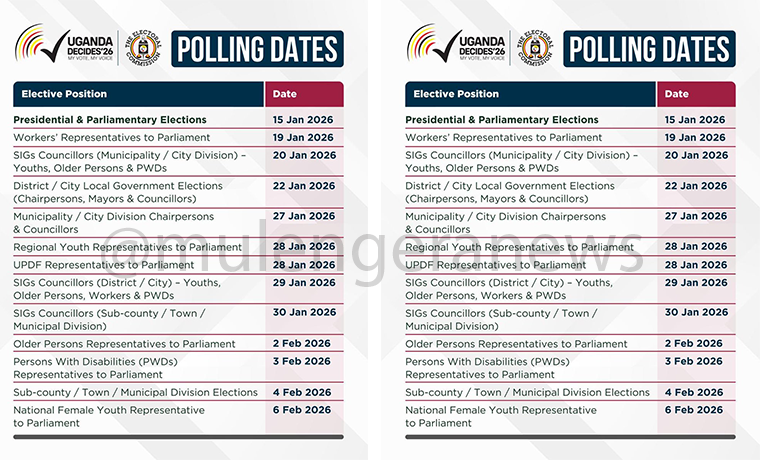By Our Reporters
Years before Janet Museveni and her team took charge at the Ministry of Education & Sports (MoES), the OPEC Fund for International Development (OFID) sought to support the President’s dream to vocationalize education training in Uganda. This was part of the broader Skilling Uganda program. And for starters, OFID is the development assistance arm of the Vienna/Austria-based OPEC which is a grouping of petroleum producing/exporting countries; Arabic and none Arabic. OFID actualized their support by availing the MoES/GoU $22.9m (roughly Shs85bn) as early as January 2011 to establish the nine (9) new Technical Institutes (TIs) in the 9 beneficiary districts that had been selected. The districts were selected because they had no semblance of vocational education (BTVET institutions) at all. Implementation began in January 2011 and was scheduled to be completed in June 2016. This (June 2016) was a month before Janet, who was deployed in the May 2016 reshuffle, became Minister here. The project was to have 90% funding from OFID and 10% counterpart funding by the GoU. Whereas OFID acted their part of the bargain, the GoU didn’t do their part. In the end, the construction works for Corner Kilak TI (Pader district), Ogolai TI (Amuria), Nawanyago TI (Kamuli), Sasira TI (Nakasongola), Lwengo TI (in Lwengo district), Buhimba TI (Hoima), Basoga Nsadhu TI (Namutumba) and Lokopio Hills TI (Yumbe district) were undertaken but not to completion because the GoU’s funding didn’t come through.









This made the 9 TIs to remain white elephant infrastructures and this is the situation Janet found as of May 2016. Something had to be done because mind you, these are remote poverty-stricken districts that didn’t have any BTVET institution. This meant on failing to carry on beyond S4 (that is the level that joins TIs), hundreds of O’level leavers simply stagnated. Yet BTVET was introduced to cater for such stigmatized learners unable to carry through to the University. The project also had a lot of political significance for the NRM government and more so its leader YK Museveni. Something had to be expeditiously done to deliver the 9 TIs to the levels originally anticipated. Gratefully, on being approached, authorities at OFID were more than willing to stay the partnership which was critical in ensuring that the $22.9m, previously committed, didn’t go to waste. That is how OFID II (July 2017-December 2022) was contemplated and agreed upon availing the new leadership at MoES $14.3m (roughly Shs51bn). This Shs51bn went into what wasn’t delivered and was still lacking to make the 9 TIs usable for BTVET training purposes. But what do TIs do? How do they differ from Uganda Technical Colleges (UTCs)? Norman Ajiri, who is the MoES Technical Manager for all Arab-funded projects, explains that TIs are very important because they absorb S4 leavers that are unable to carry on to S5 yet they aren’t qualified for admission/enrollment in UTCs. They’re one level below the UTCs and whereas UTCs offer diplomas (to S6 leavers), the TIs offer certificates to S4 leavers. They produce lower cadre guys like plumbers, electricians who eventually work under supervision of diploma holders graduated by UTCs. Ajiri explains that with the $14.3m under OFID II (2017-2022), they are adding onto the earlier work by constructing a sickbay, multi-purpose hall, 120-bed girls’ dormitory, additional staff accommodation for 4 employees and workshop facilities at each of the 9 TIs that were started upon before the new leadership took charge at Embassy House. Despite leaving an incomplete job behind, the old team (Minister Jessica Alupo, Dr. Rose Nassali etc) had managed to erect 6 classrooms (sitting 40 students at a time), an administration block and a Library/ICT Center at each of the 9 TIs. There was also a student dormitory capable of housing 120 students (both male & female), a kitchen and staff accommodation for 9 employees at each of the 9 TIs. Besides doing some external works, the old team had also modestly procured some text books, inadequate furniture, ICT & workshop equipment. Ajiri is optimistic that the enhanced infrastructure, to be delivered under OFID II, will go a long way to address stigma and negative attitude that remains a very big challenge towards successful implementation of technical and vocational education in Uganda. Vocational education is fallaciously perceived to be the option for academic dwarfs and failures who can’t qualify for University, which Ajiri says isn’t (shouldn’t be) the case. Other challenges constraining the 9 TIs include absence of electricity and having to very expensively rely on generators for the case of the TIs Yumbe and Amuria. “They have to spend on maintenance of those generators which requires funding that remains inadequately available given that these are remote poor districts upcountry,” Ajiri regrettably notes. But he is hopeful that Janet’s high profile (being First Lady as well) will prompt concerned government agencies like REA to move in and do the needful. He says even when it’s relatively cheaper to educate a child in a TI than in a University, still most upcountry parents are poor and can’t afford tuition fees. Yet government sponsorship that would have been the solution is only available for 50 students in each of the 9 TIs. The rest have to be privately sponsored. Ajiri suspects that inability to afford tuition, combined with negative attitude towards vocational education, is the reason enrolment in poorer districts like Pader remains as low as 60-70 students. That is against an enrollment capacity to take on as many as 1,000 learners! This makes it counterproductive and uneconomical for government to spend money remunerating tutors to teach such a small number of students! The other challenge is personnel-related because many of the Principals heading these TIs are newly recruited and inadequately experienced meaning they are learning institutional management (which they are recruited to do) on the job. But Ajiri is optimistic all these inevitable challenges will be overcome once the negative attitude towards vocational education (which he considers the biggest obstacle) is comprehensively addressed. Intensifying careers guidance would be a good intervention to address the attitude problem so that there is mindset change and the young people begin to more positively look at vocational education. Just like elsewhere in government, lengthy procurement processes sometimes coupled with imprudent contractors that become financially-constrained along the way, have also occasionally derailed progress on the Arab-funded projects at Janet Museveni’s MoES. “Those constraints will always be encountered but the good thing is there are mechanisms in place to resolve them including recourse to the courts of law,” asserts Ajuri who for many years has worked as a consultant on the development partner-funded projects at MoES. Ajiri also underscores the importance of leadership at the top. He says Janet Museveni’s political leadership at MoES has inspired team work and there is no more intrigue and fault-finding that was common under the pre-May 2011 technical and political leadership at the Ministry. “Our new minister [Janet] is a detailed person and always pays attention to detail. She is also hands-on and likes going to the field to see things for herself through her inspection tours. That outreach approach has inspired the PS and other technocrats to do the same. As projects teams you can’t afford not to supervise and do your work properly because those seniors will expose you one way or the other because they believe in regular follow up meetings. They also like being on the ground themselves rather than using the armchair approach,” says Ajiri who also served under the old leadership of PS Nassali and Minister Jessica Alupo. He says this new approach, ushered in by Janet & the rest of the team, is something development partners have taken note of. He says it has made them more enthusiastic towards working with the sector. This contrasts with the pre-May 2016 donor-fatigue that Prof Samuel Sejjaaka disapprovingly highlights in his late 2016 report that highlighted the extent of failure by the old MoES leadership. For comments, call, text or whatsapp us on 0703164755.
































